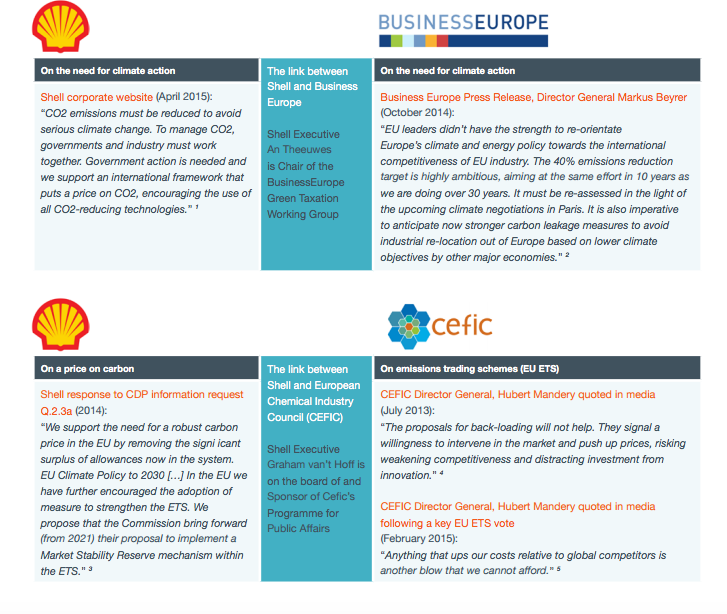A new report recently released by InfluenceMap shows a number of oil and gas companies publicly throwing their support behind climate initiatives are simultaneously obstructing those same efforts through lobbying activities.
The report, Big Oil and the Obstruction of Climate Regulations, comes on the heels of the Oil and Gas Climate Initiative, a list of climate measures released by the CEOs of 10 major oil and gas companies including BP, Shell, Statoil and Total.
According to InfluenceMap the initiative is an attempt by leading energy companies to “improve their image in the face of longstanding criticism of their business practices ahead of UN COP 21 climate talks in Paris.”
“The big European companies behind the OGCI…will come under ever greater scrutiny, as the distance between the companies’ professed positions and the realities of the lobbying actions of their trade bodies grows ever starker,” InfluenceMap stated in a press release.
The group’s analysis shows a major disconnect between climate rhetoric and action among three key policy strands: carbon tax, emissions trading and greenhouse has emissions regulations.
The findings show companies like Shell and Total publicly support carbon pricing while at the same time support trade organizations that systematically obstruct the legislation’s implementation.
Oil majors BP, Chevron and Exxon also support these lobby groups but spend less time publicly supporting a price on carbon.
Dylan Tanner, executive director of InfluenceMap, said industry is becoming more cautious of public oversight and as a result, has become subtler with its efforts to subvert climate progress.
“Companies like Shell appear to have shifted their direct opposition to climate legislation to certain key trade associations in the wake of increasing scrutiny,” Tanner said.
“Investors and engagers need to be aware that these powerful energy and chemicals-sector trade bodies are financed by, and act on the instruction of, their key members and should thus be regarded as extensions of such corporate-member activity and positions.”
The report shows Shell’s official messaging is wildly inconsistent with the positions of its trade associations.
Shell, for example, states on its website, “we support an international framework that puts a price on CO2.” However, green taxation working group BusinessEurope warned against such measures, suggesting they could threaten the “international competitiveness of EU industry.”
Shell executive An Theeuwes is chair of BusinessEurope’s Green Taxation Working Group.*
Excerpt from InfluenceMap report shows disconnect between Shell’s corporate statements and those of trade organizations supported by Shell.
Shell is also on the board of a powerful chemicals trade body in Europe, the CEFIC, that lobbied aggressively against the European Emissions Trading Scheme.
Shell is also a member of the American Petroleum Institute and the Canadian Association of Petroleum Producers, North America’s two most powerful industry lobby groups actively involved in opposing climate legislation. API‘s CEO recently criticized the UN climate talks as driven by a “narrow political ideology” and CAPP has previously disregarded opposition to the Alberta oilsands as merely “ideological” while arguing against new emissions standards.
“If oil and gas companies calling for a price on carbon want to be taken seriously it is imperative that they commit both to calling on governments to implement such a policy and at the same time ensuring that all their lobbying is 100 per cent consistent with this objective,” Anthony Hobley, CEO of Carbon Tracker, said.
“This is a strong line to take that has to be held accountable by investors, shareholders, governments and the public.”
Carbon Tracker recently released a report that finds energy companies rely too heavily on industry scenarios that project high fossil fuel consumption in the future. The analysis shows industry uses high demand assumptions “to justify new and costly capital investment to shareholders.”
Companies that are inconsistent in what they say publicly and do behind the scenes don’t deserve to be taken seriously, Hobley said.
This kind of disingenuous activity “should be seen for what it is,” he said: “a cynical attempt to manipulate public opinion and create the perception amongst shareholders that the company is taking the issue of climate change seriously.”
* This article was updated to reflect An Theeuwes’ position as chair of BusinessEurope’s Green Taxation Working Group.
Subscribe to our newsletter
Stay up to date with DeSmog news and alerts








